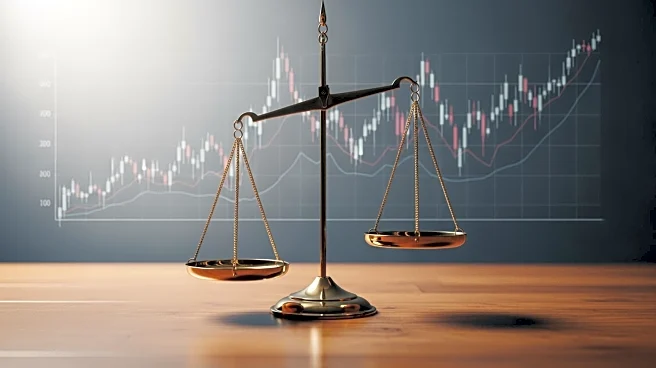What's Happening?
On Friday, U.S. stock indexes showed mixed results as the S&P 500 and Dow Jones Industrials closed slightly higher, while the Nasdaq 100 fell. This fluctuation occurred amidst ongoing negotiations between
Senate Democrats and Republicans regarding the government shutdown. Democrats proposed a one-year extension of expiring health care subsidies, which Republicans rejected, insisting on reopening the government first. The shutdown, now in its sixth week, is the longest in U.S. history and has delayed numerous government reports, affecting market sentiment and the economy. Additionally, economic concerns were heightened by a report from Challenger, Gray & Christmas, indicating significant job cuts in October, and a drop in consumer sentiment to a 3.5-year low, as reported by the University of Michigan.
Why It's Important?
The prolonged government shutdown is having a significant impact on the U.S. economy, delaying critical government reports and potentially leading to job losses and reduced consumer spending. The negotiations between Democrats and Republicans are crucial as they could lead to reopening the government, which would alleviate some economic pressures. The stock market's response to these negotiations reflects investor sentiment and the broader economic implications. Furthermore, the Federal Reserve's cautious approach to interest rate cuts, as indicated by Vice Chair Philip Jefferson, suggests ongoing economic uncertainty. The outcome of these negotiations could influence future fiscal policies and economic stability.
What's Next?
If Democrats and Republicans reach an agreement to reopen the government, it could lead to a stabilization of market sentiment and a resumption of delayed government reports. The Federal Reserve's next meeting in December may also be influenced by these developments, with a potential rate cut on the horizon. Additionally, the U.S. Supreme Court's upcoming decision on President Trump's reciprocal tariffs could have significant implications for trade policies and economic relations. Stakeholders, including businesses and policymakers, will be closely monitoring these events for potential impacts on the economy and market dynamics.
Beyond the Headlines
The government shutdown highlights deeper issues within U.S. political dynamics, including partisan divisions that affect legislative processes and economic policies. The ongoing negotiations and their outcomes could set precedents for future political interactions and governance strategies. Moreover, the Supreme Court's decision on tariffs could redefine executive powers and trade regulations, impacting international relations and economic strategies.









